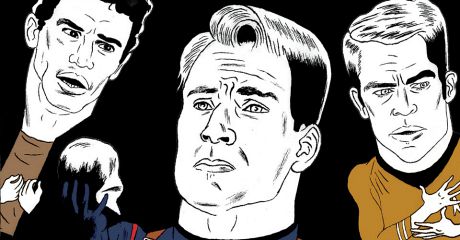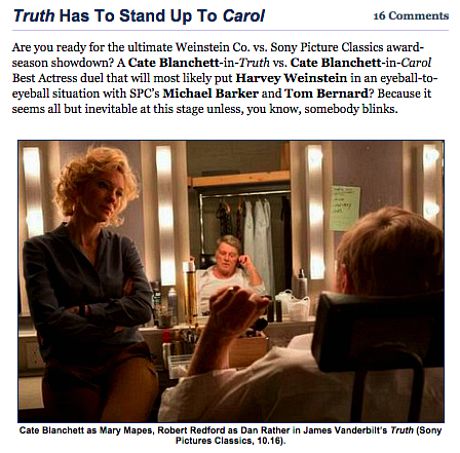Two days ago it was announced that Hitchbot, the R2D2-sized hitchhiking robot with the GPS-like voice, has been murdered and dismembered in Philadelphia. Hitchbot had encountered nothing but kindness, wonder and fascination during solo trips across Europe, Canada and portions of the Northeast USA — Boston, Salem, Gloucester, Marblehead and New York City. But a Philadelphia animal or two or three (probably 12 or 13 or 14, either stupid or under-educated or both, most likely parentally-abused) decided to clock that robot bitch once and for all. Ain’t that America? Apart from the teenaged-animal element, I’m also sensing a metaphorical linkage between Hitchbot’s murder and Ted Cruz’s machine-gun bacon video. Eating bacon is…well, okay, I’ll eat a little bacon if it’s burnt like a cinder but cooking it with a machine-gun barrel? What kind of deranged beast even thinks something like this up, much less makes a video of it? I’m telling you that the seed of the Cruz attitude was a roundabout factor in the slaying of Hitchbot. There’s a massively ugly metaphor in both these acts that joins them together in infamy. Bill O’Reilly needs to write a “Killing Hitchbot” book…seriously. If he wrote it honestly and reportedly it thoroughly, I would buy it and pay to see the movie.
Daily
Instant Thud?
“Based on the poster, that Man from UNCLE movie looks like a stylish adaptation of the word ‘why'” — tweeted by “Boobs Radley” a.k.a. Julianne Smolinski, a writer for Netflix’s Grace and Frankie.

Resting Bastard Fuckface
A N.Y. Times Cultural Studies article about “resting bitch faces,” written by Jessica Bennett and dated 8.1, caught my attention yesterday. Otherwise known as RBF, the Facebook-shared term refers to that expression we all get when we’re not turning on the charm for friends or a camera, when we’re bored or driving or vaguely pissed about something. Kind of a blank frowny face. Bennett says that the label has apparently caused some consternation among women who don’t want to be perceived as being any kind of pouty pisshead because guys will be turned off. Or something like that.
The piece hit home because I was told the same thing once by a former girlfriend (“Why are you always frowning?) and I’ve never forgotten it. That old saying that “the face you have at 40 is your own” began to haunt me. And then in the late ’80s I began to notice that my mouth had developed downturned corners. I decided then and there that I didn’t want to have a resting bastard fuckface and I’ve been working against my “permafrown” ever since.
I consciously try to half-smile at all times when I’m walking around, and I try to concentrate on alpha waves and positive thoughts and…you know, funny things I’ve written about and the Baghavad Gita and stuff like that. I try and exude a certain cosmic serenity and I never step on cracks in the sidewalk. God help me but I don’t want to look like Hillary Clinton…you know, that hangdog, crabby-faced thing. I want to look relatively happy and at peace with life or at least semi-content.
A Close Mother-Daughter Resemblance in a Family Relationship Movie?
Ricki and The Flash (TriStar, 8.7) has been pre-screened and junketed and interviewed up the lah-lah, but so far no reviews. Which is a bit unusual for a film opening four days hence. But it’s very pleasing to see, for once, a mother and a daughter played by actresses (Meryl Streep, Mamie Gummer) who actually, for obvious reasons, resemble each other. Unlike 99.5% of the other mother-daughter pairings in Hollywood movies, who don’t even look like they could be cousins. The less-than-totally-cool, non-junketing all-media types (i.e., people like myself) will take a gander at Jonathan Demme and Diablo Cody’s latest tomorrow night. Fingers crossed.
Deadline‘s Michael Fleming: “After all the summer frivolity for young audiences, is it time for adults to step back into the pool? Tom Rothman is betting big with the upcoming Ricki and the Flash. The film opens Friday, in the slot that brought success for the Helen Mirren-starrer The Hundred Foot Journey and other adult films.” Is that a “money” analogy? Who saw or paid the slightest attention to The Hundred Foot Journey apart from journos and industry bluehairs? If you ask me Fleming has just stabbed Ricki and the Flash in the chest with a sharp pencil.
Millenial Actors Letting Us Down, Getting Elbowed Aside By Brits
The thrust of this Terrence Rafferty piece in The Atlantic is that under-40 American actors don’t have the chops and the snap and the vitality that same-generation British actors do, and that this American fraternity of younger male thesps is…well, what’s missing exactly? Is it because they’re too cautious, “ironic”-minded or insincere or just…what, confused? The point is that things were hopping for young American actors in the ’70s and to a slightly lesser extent in the ’80s, ’90s and early aughts…but not now. The faces of Chris Pine, James Franco and Chris Evans comprise the art but who else could be included?

“Is it time for American actors to take a hard look in the mirror?,” the piece begins. “Earlier this year Michael Douglas mused darkly to a magazine interviewer, ‘I think we have a little crisis going on amongst our young actors at this point,’ and Spike Lee, commenting on the “invasion” of black British actors, had some pithy observations on the subject, too: ‘You want talented people,’ he said, and British actors’ ‘training is very proper, whereas some of these other brothers and sisters, you know, they come in here and they don’t got that training.'”
One exception, Rafferty feels, is Michael B. Jordan (Fruitvale Station, Creed). Another, I believe, is Paul Dano, who is so far still (i.e., among movies that have been released in 2015) the leading Best Actor candidate for his Brian Wilson performance in Love & Mercy. And let’s not forget Jake Gyllenhaal, of course, and his brilliant Nightcrawler performance. (Southpaw, not so much.) And, I suppose, Jesse Eisenberg, but I have this feeling that he’s been half-slumming since The Social Network.
Remember that Leonardo DiCaprio, Joaquin Phoenix, Christian Bale and Johnny Depp are now 40-plus and more or less middle-aged so they can’t be included. Remember that Michael Fassbender, 37, is German Irish and Ryan Gosling, 34, is Canadian.
My Honest First Thought?
A half second before associating this image with the forthcoming Batman vs. Superman: Dawn of Justice and particularly Jesse Eisenberg‘s Lex Luthor (which is sure to be a Mark Zuckerbergian spin on yet another standard-issue, flamboyantly sociopathic comic-book villain), I flashed on LexG, i.e, the “real” Lex who is still, it appears, sadly and embarassingly hiding out. One of the leading metaphors or manifestations of the Schlumpy & Dumpy era (i.e., a guy who pollutes his bod with drinking and whatnot but who lives resplendently within) and he’s not even “here”? The guy who was born to write and he’s doing what now, eating a baloney sandwich in the kitchen? He said three or four weeks ago that he’s just “found the internet in general to be unpleasant and not helpful to my happiness for quite some time…just enjoying some time away from it.” Of course the internet is unpleasant! That’s like George S. Patton saying he doesn’t want to fight the Germans during the Battle of the Bulge because it’s too cold and foggy.

Bless Us With Your Presence, Dave Grohl! Actually, Never Mind.
I would loved to have been there in Cesana just to hear all those drummers — a percussionist symphony for the ages. What a field day for the heat. A thousand people in the street….er, the Piedmont hills. Playin’ songs they carry inside. Except it was just one song — Foo Fighters‘ “Learn to Fly,” performed by a thousand exuberant Italians who were nonetheless grovelling at the feet of the wonderful messiah Dave Grohl. Hear our joy and consider our passion, Foo Fighters!…our lives will be incomplete if you don’t come to Italy and play for us! But in their self-abasing worship, this crowd transcended Grohl and in fact all of the Grohls of the world. Their performance was probably better than anything the Foo Fighters could have possibly brought to the table. Hats off to award-winning conductor Marco Sabiu for arranging this.
Stephen Hawking Doesn’t Approve
The question shouldn’t be “if God exists then whey did he make ugly people?” The question should be “if God exists, why didn’t he just eliminate beauty and make everyone into a schlumpy and dumpy type so that we could all be people who define ourselves by what we are inside and…you know, be able to rock out with super-feisty personalities and be extra-clever and witty and valuable in a crackling spiritual sense without being hung up on ‘looks’ or ‘beauty’ or even being all that good in bed?”
Downside of Pixie Cuts
There’s nothing wrong with pixie cuts. It obviously depends on the shape of the face and how good the hairdresser is, but some women look good in them (Ellen Degeneres), some look great (Judi Dench, Jamie Lee Curtis) and some former pixie-wearers have looked better with their hair grown out a bit (i.e., Carey Mulligan, Charlize Theron). But when some older women wear them it’s like they’ve got an electric sign around their necks that says “I’ve reached that proverbial age when my hairdresser has told me I’ll look younger with a pixie, but of course I don’t — it just looks like I’m doing the same thing that hundreds of thousands of other 50-plus women with gray hair are doing.” I know that my mother wore her hair in a pixie when I was a kid and I didn’t like it then. I think there’s something profoundly unsexy about them. Tingly dream scenarios about this or that woman flash in my head when I’m out and about, but I’ve never had a single fleeting fantasy about a woman in a pixie cut…not one. When I talk to a pixie-cut woman it’s like I’m talking to Lee Marvin in The Wild One or a sanitation engineer or a meter maid. And I felt a slight current once when I was talking to Lily Tomlin at an I Heart Huckabees party so don’t tell me. I honestly believe there’s nothing less stirring than a pixie cut. I’m not saying that older women who let their hair grow out and do the old silver bohemian thing are the cat’s meow, but at least this isn’t an instant shutdown.

Walk It Right Back
Yesterday I riffed on a possibility that we might be seeing a Cate Blanchett-vs.-Cate Blanchett Best Actress competition this fall. The notion was that Cate’s Oscar-touted performance in Todd Haynes‘ Carol might be matched by her portrayal of former CBS producer Mary Mapes in Truth. Well, right away HE commenter RealBadHatHarry claimed he’d seen Truth and cast doubt on the afore-mentioned scenario, in part because the film, he said, is too reflexively liberal. Then a friend called and asked who had told me that Blanchett’s Truth performance was extra special. “A non-vested marketing guy who attended a buyer’s screening two or three months ago,” I answered. Then my friend told me “there’s no way this film will be in the award-season conversation.” Not even for Blanchett’s performance? “Her competitive pony is Carol,” he said. I asked if he’s seen Carol and he said no. Then he said the makers of Truth were “still working on it,” a phrase which sometimes means that the value of a film might be in question. Then he asked if I could think of a single critically praised film that was set in the U.S. but shot overseas. (Truth was mainly filmed in Sydney.) I was moved by the call because he was basically trying to save me from embarassment down the road. And then another friendo passed along the same buzz. So without casting any aspersions let’s modify the tone of yesterday’s article and pledge to see Truth whenever it screens (it’s conceivable that it might not go to Telluride) and see how everything shakes down on a step-by-step basis.

Five Bars
After putting up with an occasionally spotty AT&T signal for years, I’ve popped for one of those phone-signal enhancers they sell for $150 and change. At my place, I mean. The AT&T MicroCell “acts like a mini cellular tower, boosting cellular performance in your home or small business,” etc. I’ve also decided to cut ties with Time Warner and go with an AT&T cable/wifi plan that will cut my monthly down from $260 and chance to less than $100 per month. What the hell, shake things up, see what happens.


Calm Suggestion
What Diane Sawyer passes along in this clip is nothing earth-shaking, but it touched me: “A criticism is just a really bad way of making a request, so why don’t you just make a request?” I’ve rarely done this because most married partners (a) tend to see such a request (i.e., “could you maybe think about modifying this or that behavioral trait?”) as an assault upon their magnificence and (b) lack the humility or the character to modify anything about themselves in the first place unless it’s alcohol-related. But you never know with people. The best thing is probably to say nothing. Just tough it out.
